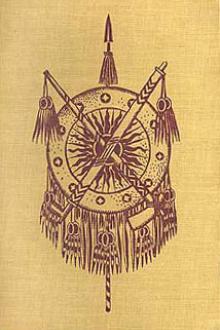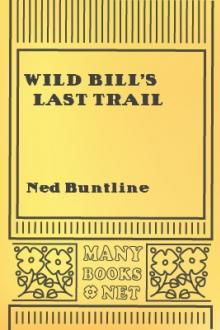The Hidden Children, Robert W. Chambers [e book reader free .txt] 📗

- Author: Robert W. Chambers
Book online «The Hidden Children, Robert W. Chambers [e book reader free .txt] 📗». Author Robert W. Chambers
He rose and began to pace the handsome parlour, evidently worried and perplexed; and presently he halted before us, who had of course risen in respect.
"Gentlemen," he said, "I must lay bare to you our military necessity, embarrassment, and mortification in this country of Westchester, so that you may clearly understand the difficulty of furnishing the recruits you ask for.
"South of us, from New York to North Castle, our enemy is in possession. We are attempting to hold this line; but it is a vast country. We can count on very few Continental troops; our militia has its various rendezvous, and it turns out at every call. The few companies of my regiment of foot are widely scattered; one company left here as escort to the military train an hour ago. Sheldon's 2nd Light Dragoons are scattered all over the country. Two troops and headquarters remain now here at my house."
He waved his hand westward: "So desperate is our condition, gentlemen, that Colonel Moylan's Dragoons have been ordered here, and are at this moment, I suppose, on the march to join us. And—I ask you, gentlemen—considering that in New York City, just below us, there are ten thousand British regulars, not counting the partizan corps, the irregulars, the Tory militia, the numberless companies of marauders—I ask you how you can expect to draw recruits from the handful of men who have been holding—or striving to hold—this line for the last three years!"
Boyd shook his head in silence. As for me, it was not my place to speak, nor had I anything to suggest.
After a moment the Major said, more cheerfully:
"Well, well, gentlemen, who knows after all? We may find ways and means. And now, one other matter remains to be settled, and I think I may aid you."
He went to the door and opened it. The sentry who stood across the hall came to him instantly and took his orders; and in a few moments there entered the room four gentlemen to whom we were made known by Major Lockwood. One of these was our Captain of Minute Men. They were, in order, Colonel Sheldon, a fretful gentleman with a face which seemed to me weak, almost stupid; Colonel Thomas, an iron-grey, silent officer, stern but civil; Captain William Fancher, a Justice of the Peace, Judge of the Court of Common Pleas, and holding his commission as Captain of Minute Men; and a Mr. Alsop Hunt, a Quaker, son-in-law of Major Lockwood, and a most quiet and courteous gentleman.
With one accord we drew chairs around the handsome centre table, where silver candlesticks glimmered and a few books lay in their fine, gilded bindings.
It was very evident to us that in the hands of these five gentlemen lay the present safety of Westchester County, military and civil. And to them Major Lockwood made known our needs—not, however, disturbing them in their preconceived notion, so common everywhere, that the blow to be struck from the North was to be aimed at the Canadas.
Colonel Sheldon's weak features turned red and he said almost peevishly that no recruits could be picked up in Westchester, and that we had had our journey for our pains. Anyway, he'd be damned if he'd permit recruiting for riflemen among his dragoons, it being contrary to law and common sense.
"I've a dozen young fellows who might qualify," said Colonel Thomas bluntly, "but if the law permits Mr. Boyd to take them my regiment's volleys wouldn't stop a charge of chipmunks!"
We all laughed a little, and Captain Fancher said:
"Minute Men are Minute Men, Mr. Boyd. You are welcome to any you can enlist from my company."
Alsop Hunt, being a Quaker, and personally opposed to physical violence, offered no suggestion until the second object of our visit was made known. Then he said, very quietly:
"Mayaro, the Mohican Sagamore, is in this vicinity."
"How do you know that, Alsop?" asked Major Lockwood quickly.
"I saw him yesterday."
"Here in Poundridge?"
Mr. Hunt glanced at Colonel Thomas, then with a slight colour mounting to his temples:
"The Sagamore was talking to one of the camp-women last evening—toward sundown on the Rock Hills. We were walking abroad for the air, my wife and I——" he turned to Major Lockwood: "Betsy whispered to me, 'There is a handsome wench talking to an Indian!' And I saw the Sagamore standing in the sunset light, conversing with one of the camp-women who hang about Colonel Thomas's regiment.".
"Would you know the slattern again?" asked Colonel Thomas, scowling.
"I think so, Colonel. And to tell the truth she was scarce a slattern, whatever else she may be—a young thing—and it seemed sad to us—to my wife and me."
"And handsome?" inquired Boyd, smiling at me.
"I may not deny it, sir," said Mr. Hunt primly. "The child possessed considerable comeliness."
"Why," said Boyd to me, laughingly, "she may be the wench you so gallantly rescued an hour since." And he told the story gayly enough, and with no harm meant; but it embarrassed and annoyed me.
"If the wench knows where the Sagamore may be found," said Major Lockwood, "it might be well for Mr. Loskiel to look about and try to find her."
"Would you know her again?" inquired Colonel Thomas.
"No, sir, I——" And I stopped short, because what I was about to say was not true. For, when I had sent the soldiers about their business and had rejoined Boyd—and when Boyd had bidden me turn again because the girl was handsome, there had been no need to turn. I had seen her; and I knew that when he said she was beautiful he said what was true. And the reason I did not turn, to look again was because beauty in such a woman should inspire no interest in me.
I now corrected myself, saying coolly enough:
"Yes, Colonel Thomas, on second thought I think I might know her if I see her."
"Perhaps," suggested Captain Fancher, "the wench has gone a-gypsying after the convoy."
"These drabs change lovers over night," observed Colonel Thomas grimly. "Doubtless Sheldon's troopers are already consoling her."
Colonel Sheldon, who had been fiddling uneasily with his sword-knot, exclaimed peevishly:
"Good God, sir! Am I also to play chaplain to my command?"
There was a curious look in Colonel Thomas's eyes which seemed to say: "You might play it as well as you play the Colonel;" but Sheldon was too stupid and too vain, I think, to perceive any affront.
And, "Where do you lodge, gentlemen?" inquired our Major, addressing us both; and when he learned that we were roofless he insisted that we remain under his roof, nor would he hear of any excuses touching the present unsuitability of our condition and attire.
"Gentlemen, gentlemen! I will not accept a refusal," he said. "We are plain folk and live plainly, and both bed and board are at your disposal. Lord, sir! And what would Clinton think were I to send two officers of his corps d'�lite to a village ordinary!"
We had all risen and were moving toward the door. A black servant came when the Major pulled the bell card, and showed Boyd and myself to two pretty chambers, small, but very neat, where the linen on the beds smelled fresh and sweet, and the westering sun struck golden through chintz curtains drawn aside.
"Gad!" said Boyd, eying the bed. "It's long since my person has been intimately acquainted with sheet and pillow. What a pretty nest, Loskiel. Lord! And here's a vase of posies, too! The touch feminine—who could mistake it in the sweet, fresh whiteness of this little roam!"
Presently came our rifleman, Jack Mount, bearing our saddle-bags; and we stripped and washed us clean, and put on fresh linen and our best uniforms of soft doeskin, which differed from the others only in that they were clean and new, and that the thrums were gayer and the Iroquois beadwork more flamboyant.
"If I but had my hair in a snug club, and well powdered," sighed Boyd, lacing his shirt. "And I tell you, Loskiel, though I would not boast, this accursed rifle-shirt and these gaudy leggings conceal a supple body and a leg as neatly turned as any figure more fortunately clothed in silken coat and stockings!"
I began to laugh, and he laughed, too, vowing he envied me my hair, which was yellow and which curled of itself so that it needed no powder.
I can see him yet, standing there in the sunshine, both hands gripping his dark hair in pretense of grief, and vowing that he had a mind to scalp himself for very vexation. Alas! That I remember now such idle words, spoken in the pride and strength and gayety of youth! And always when I think of him I remember his dread of fire—the only fear he ever knew. These things—his brown eyes and quick, gay smile—his lithe and supple person—and his love of women—these I remember always, even while already much that concerned this man and me begins to fade with the stealthy years.
While the sun still hung high in the west, and ere any hint of evening was heard either in the robin's note or from the high-soaring martins, we had dressed. Boyd went away first, saying carelessly that he meant to look to the horses before paying his respects to the ladies. A little later I descended, a black servant conducting me to the family sitting room.
Here our gallant Major made me known to his lady and to his numerous family—six young children, and still a seventh, the pretty maid whom we had seen on approaching the house, who proved to be a married daughter. Betsy, they called her—and she was only seventeen, but had been two years the wife of Alsop Hunt.
As for the Major's lady, who seemed scarce thirty and was six years older, she so charmed me with her grace, and with the bright courage she so sweetly maintained in a home which every hour of the day and night menaced, that even Mrs. Hunt, with her gay spirits, imperious beauty, and more youthful attractions, no more than shared my admiration for her mother.
In half an hour Lieutenant Boyd came in, was presented, and paid his homage gayly, as he always did. Yet, I thought a slight cloud rested on his brow, but this soon passed, and I forgot it.
So we talked of this and that as lightly as though no danger threatened this house; and Boyd was quickly at his best with the ladies. As for me, I courted the children. And I remember there were two little maids of fourteen and eleven, Ruhannah and Hannah, sweet and fresh as wild June roses, who showed me the tow cloth for our army which they were spinning, and blushed at my praise of their industry. And there was Mary, ten, and Clarissa, eight, and two little boys, one a baby—all save the last two children carding or spinning flax and tow.
It was not easy to understand that this blooming matron could be mother of all of these, so youthful she seemed in her Quaker-cut gown of dove-colour—though it was her handsome, high-spirited daughter who should have worn the sober garb.
"Not I," said she, laughing at Boyd. "I'd sooner don jack-boots and be a dragoon—and we would completely represent a holy cause, my husband with his broad-brim and I with my sword. What do you say, Mr. Boyd?"
"I beg of you first to consider the rifle-frock if you must enlist!" urged Boyd, with such fervour that we all laughed at his gallant effort to recruit such beauty for our corps; for even a mental picture of Betsy Hunt in rifle-frock seemed too adorable. Mr. Hunt, entering, smiled in his quiet, embarrassed way; and I thought that this wise and gentle-mannered man must have more than a handful in his spirited young wife, whose dress was anything but plain.
I had taken the tiny maid, Clarissa, upon my knees and was telling her of the beauty of our Northland, and of that great, dusky green ocean of giant pines, vast as the sea and as silent and uncharted, when Major Lockwood bent over me saying in a quiet voice that it might be well for me to look about in the town for the wench who knew the whereabouts of Mayaro.
"While there is still daylight," he added, as I set Clarissa on the floor and stood up, "and if she be yet here you should find her before supper time. We sup at six, Mr. Loskiel."
I bowed, took leave of the ladies, exchanged an irritated glance for Boyd's significant grin, and went out to the porch, putting on my light round cap of moleskin. I liked neither my present errand, nor Boyd's smile either.
Now, I had not thought to take with me my side-arms, but a slave waited at the door with my belt. And as I buckled it and hung war-axe and heavy hunting blade, I began to





Comments (0)